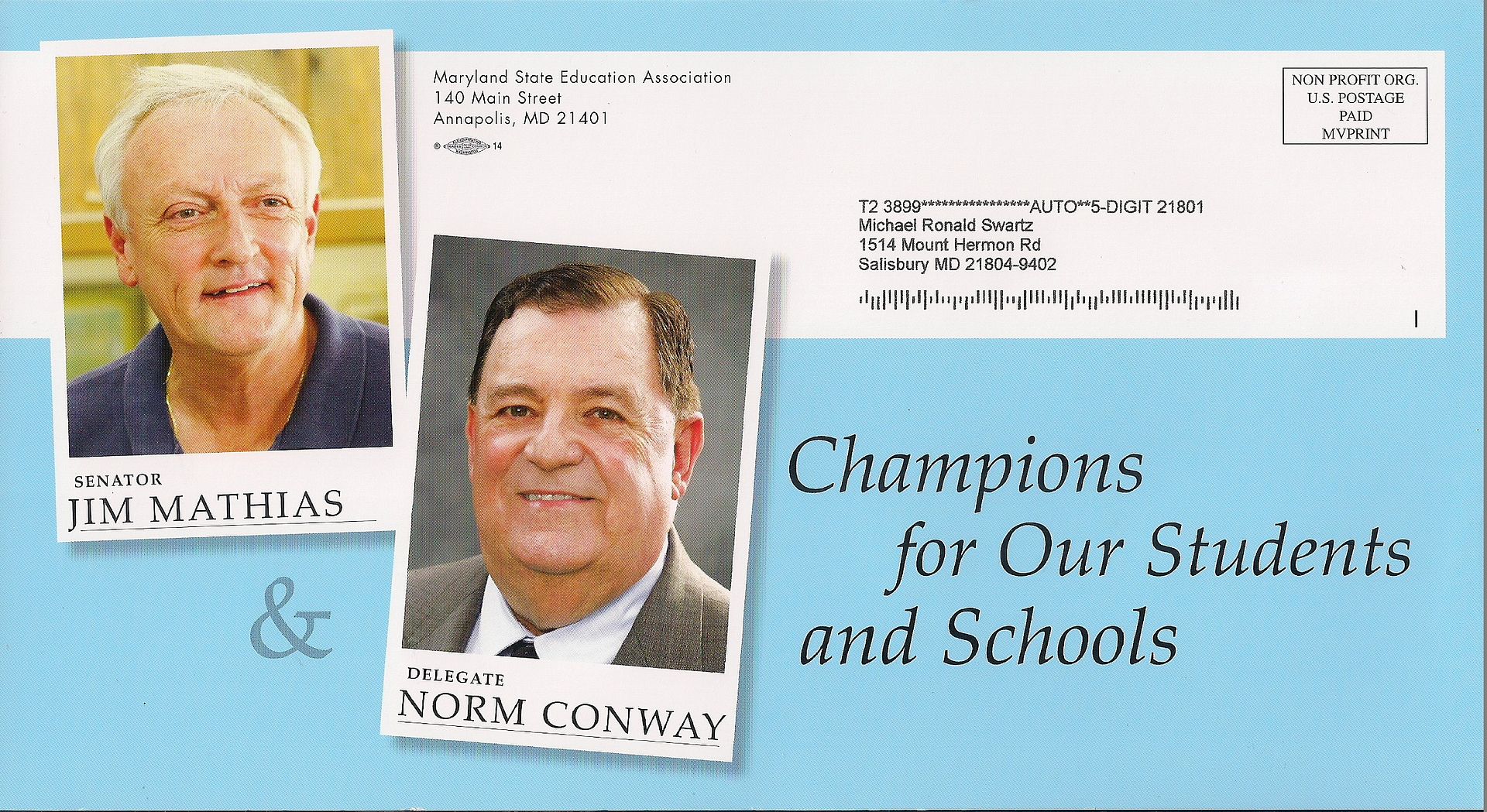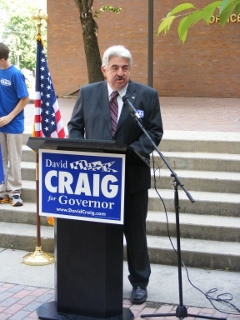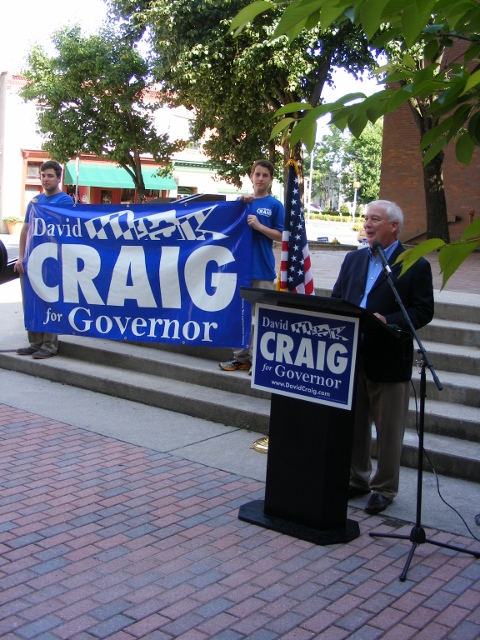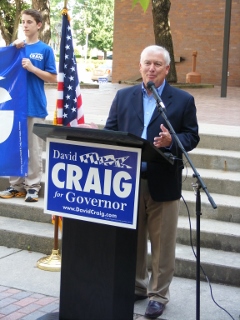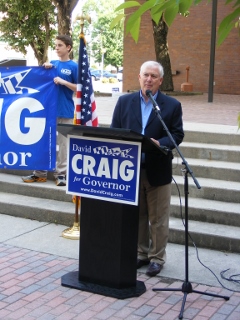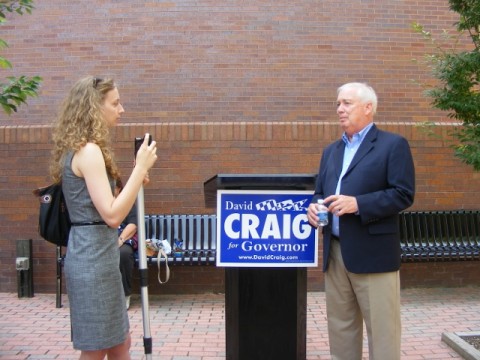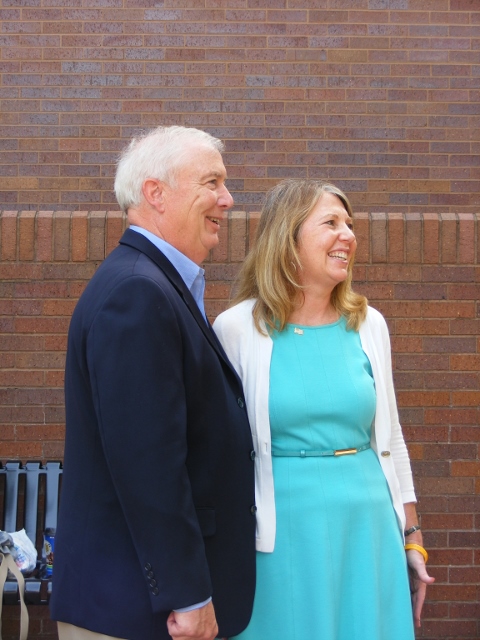Back in December, once I finished the original dossier series, I noted this would be an ongoing process. To that end, here are further statements made by the three contenders at the time, with the addition of items from Larry Hogan.
Each of these subcategories will be revisited, with changes in score noted.
**********
The 2014 monoblogue endorsement will be based on the following formula:
Election/campaign finance reform (3 points)
Larry Hogan: As a practical matter, seeking public financing made sense for Mr. Hogan, who entered the Republican primary race relatively late and was unlikely to raise as much privately as he may qualify for publicly. But he also noted that his decision ‘sends a great message’ about his grass-roots efforts. (Baltimore Sun, February 4, 2014)
Ron George has also talked about taking public financing, although he’s made no formal decision on the matter. He had no points anyway, nor will Hogan receive any.
Illegal immigration (5 points)
No candidates have made significant public pronouncements on the subject, so no changes and no points for Larry Hogan.
Dealing with Obamacare (7 points)
David Craig: Craig has previously called on O’Malley and Brown to stop wasting money and hindering access to health care and to promote direct enrollment options through insurance carriers and brokers. The Administration then took a modest step in that direction by working with insurance industry leaders to develop a telephone help line. (press release, February 10, 2014)
*
Craig, the Republican gubernatorial candidate, said the O’Malley administration should instead be helping people get coverage directly through the insurers. He wants to reallocate $150 million, originally earmarked in part to market the problematic exchange, toward promoting alternative enrollment options. (Fox News, January 7, 2014)
*
Craig’s proposal would seek an HHS waiver to re-program funds to launch a public awareness campaign informing consumers of their right to obtain health insurance directly through carriers. A complimentary awareness campaign would inform people of their rights to utilize Maryland insurance brokers who are licensed and experienced in helping individuals with health insurance. Utilizing call centers for those needing assistance with the website would remain in place. Craig, however, would re-examine the navigator model in which people having problems with the website must set appointments with temporary workers disbursed among several organizations.
As for the vexing issue of low-income individuals seeking subsidies, Craig supports U.S. Sens. Ben Cardin and Barbara Mikulski’s proposal to HHS to enable a direct data hub allowing people to obtain financial assistance without going through an exchange. (citybizlist, January 7, 2014)
Charles Lollar: Lollar advocates making hospital costs “much more transparent” by posting the prices. “Until we control the costs we’re not going to get our arms around the health care issue.”
“I’m all for a moratorium on the Affordable Care Act.” (Fox 45 debate, January 16, 2014)
I had previously chided Craig for not offering up solutions (although he had done a nice job identifying the problems) but I’m not sure I like much of the approach he’s taking besides the idea about promoting alternative enrollment options. I’ll give him 1.5 points, up from none.
Lollar seems to have a better idea as far as approach, although it’s still very vague. The moratorium alone, though, is worth 2 points (he had none as well.)
Larry Hogan hasn’t addressed this, so no points.
Energy policy (8 points)
No candidates have made significant public pronouncements on the subject, so no changes and no points for Larry Hogan.
Education (9 points)
Ron George: He acknowledged that a repeal of Common Core “ain’t going to happen in the state” of Maryland. But he argues for putting the educational focus back on what he calls a “local locus of control” rather than a one size fits all federal mandate. George also believes it is important to teach entrepreneurship and financial literacy in schools in an effort to help minorities and low-income Marylanders understand how to be successful in a free enterprise system. (In The Capital, January 15, 2014)
Charles Lollar: Lollar wants to stress internships for high schoolers, with the help of corporations. (Fox 45 debate, January 16, 2014)
Let me talk about Ron George first. It’s interesting that he has gone from “I intend to fight it with all my energy” in September to “(repeal) ain’t going to happen” just four months later. I have a problem with that change of heart because if you’re elected as governor you have an automatic bully pulpit.
Look at how we were saddled with gay marriage. It didn’t happen until Martin O’Malley decided to burnish his 2016 credentials and made it an issue in 2012 (with an assist from Barack Obama, who needed the gay vote.) If you want to get rid of Common Core, you browbeat the legislators who oppose you until you get your way. So I took him down from 4 points to 3.
On the other hand, I think Lollar’s idea is pretty good so I bumped him from six points to seven.
Second Amendment (11 points)
David Craig on Rodricks show tells Dan Yes I SUPPORT concealed carry! (Facebook page, February 10, 2014)
Larry Hogan is a strong supporter of the Second Amendment and is opposed to SB 281. He will work to keep guns away from criminals and the mentally ill. Hogan supports tougher mandatory sentencing for criminals who commit crimes with a gun, but he is against taking away the rights of law abiding citizens. (Facebook page)
I added a half-point to David Craig (from 8 to 8.5) for the clarification. Conversely, I think Hogan’s canned response is somewhat wishy-washy and political. He may be opposed to SB281, but will he repeal it? The time for opposition is over – the word is “repeal.” So he gets 4 points of 11.
War on Rural Maryland (12 points)
Charles Lollar: Leadership in Annapolis needs to craft a regional solution to this problem that requires all states that pollute the Bay to “pay their fair share” to keep it clean. We must not allow legislators in Annapolis to “hurt Maryland first” by bankrupting hard-working farmers with a “Chicken Tax” and putting the future of Maryland’s number one economic industry at risk. (press release, February 5, 2014)
Lollar picks up a half-point for this, from 5 points to 5.5 points. It’s pretty easy to oppose the chicken tax but Lollar did it quite forcefully.
Role of government (13 points)
Larry Hogan: Job one will be to get the government off our backs and out of our pockets so we can grow the private sector, put people back to work and turn our economy around.
Every decision Larry Hogan makes as governor will be put to a simple test – Will this law or action make it easier for families and small businesses to stay in Maryland and will it make more families and businesses want to come to Maryland?
If something comes across Hogan’s desk as governor that doesn’t pass this test, he’ll veto it. (campaign website)
*
We’ve got to be able to run the government, provide the services that are important and necessary to people as efficiently and cost-effectively as possible, so it’s not like let’s lop off this department or stop providing these services – I think it’s just looking at zero-based budgeting and doing outside audits of every state agency and saying how do we use those tax dollars more effectively.
I think we need to focus on – these aren’t Republican problems or Democrat problems, these are serious problems that our state has. We’ve got to reach across the aisle and work together between the parties to come up with common-sense solutions to solve these things. (NewsTalk with Bruce DePuyt, January 21, 2014)
Charles Lollar: A government should serve its citizens, not burden them. It must also provide for citizens truly in need without trapping them in an endless cycle of dependency on government programs that erode their self confidence, human dignity, and a chance to live the American dream.
The answer is not to grow bigger government.
The answer is to empower people with the skills and opportunity to grow a better future for themselves, and not allow government to stand in the way of these goals. (Facebook page, January 12, 2014)
Okay, as far as Larry Hogan is concerned, I get it. You want to work with Democrats. Good luck with that, because we will likely have four years of gridlock unless the voters of Maryland come to their collective senses and elect a Republican majority in the General Assembly. You will have a LOT of vetoes otherwise.
I have yet to be convinced there is such a thing as a broad centrist coalition, since to me all it means is we walk further away from truly being a Free State rather than sprint headlong as we are now. But I will allow 4 of 13 points for the smell test and the zero-based budgeting.
Lollar loses one point for that answer, from 6 to 5. Where is it government’s role to provide for those truly in need? Shouldn’t that be more of a function of the faith-based community? The very definition of government standing in the way is to have government programs one can become dependent on – to me the continuing spiral of unemployment benefit extensions is a perfect example.
Job creation and transportation (14 points)
David Craig: I think that each individual county should establish its own minimum wage. It just makes sense that local officials make laws and the State doesn’t simply dictate what should be done. (Facebook page, February 11, 2014)
Ron George: We must focus on expanding opportunities for entrepreneurs and technical training for our unemployed to protect and grow our middle class for generations to come. (Press release, January 23, 2014)
Charles Lollar: Of course we want better opportunities, better modes of transportation – a diverse collection of different ways to get back and forth to work. Liveable, workable, playable communities where you can actually live, work, and play in the same place and have a legitimate conversation with yourself in the morning whether to walk or drive your bike to work and get there on time.
I think (the Purple Line) is absolutely doable. The question is – is it affordable? If it is, let’s push forward. (2014 gubernatorial candidate transportation forum, February 18, 2014)
The idea David Craig has is a good one, and would have raised him a full point if he had allowed counties to do away with the minimum wage altogether. Yes, this would be a fight with the federal government but it’s a Tenth Amendment fight worth having. I’ll give him a half-point so he goes from 9 to 9.5 points.
Ron George already had a very solid approach, so there wasn’t a lot of room for imporovement there. The statement is a little bit generic.
Suddenly, though, I think Charles Lollar caught his populist, pandering disease at an inopportune time. I know Red Maryland nailed him for one statement (which brought this gem to my attention) but I remembered that Lollar was opposed to the Purple Line last September – now he says it’s “absolutely doable”? He wasn’t pushing the bus alternative in front of that crowd.
And the phrase he was looking for insofar as “livable…communities” is (so-called) Smart Growth. Don’t encourage the idiots, Charles. I took off three points, from 7 to 4.
Hogan misses out on this category so far.
Fiscal conservatism/taxation (15 points)
David Craig: Under Craig’s plan, tax brackets would be lowered across the board to 4.25 percent as of 2016. Couples now pay a basic rate of 4.75 percent on most of their income. Wealthier Marylanders pay a higher percentage on a sliding scale that tops out at 5.5 percent on income above $300,000.
Craig said he would couple that with an increase in the personal exemption from $3,200 to $5,000. He said that will provide relief to middle-class that would help offset the face that the greatest benefits under his plan would go to the higher income brackets, which would see the highest percentage drop.
In the second phase, Craig said he will call for a further reduction to a maximum rate of 3 percent — with a bump in the exemption to $6,000.
Craig said a third phase in his plan, which would come sometime in what he hopes will be his second term, would eliminate the tax entirely. He said his proposal would not affect county piggyback income taxes, which the state would continue to collect.
According to Craig, elimination of the income tax would put Maryland in the company of nine states that have no income tax, including Texas, Florida and Tennessee. (Baltimore Sun, February 18, 2014)
Ron George: When asked what policies he will put in place to foster job creation, George said lowering the corporate tax rate is a necessary first step. “We have to lower the corporate tax rate,” he said. “I would like to get it down to 5.75 percent and I think that sends a strong message out there that we’re open for business.” This, he argues, will help bring businesses back to Maryland thereby expanding the tax base and creating more revenue for the state. (In The Capital, January 15, 2014)
*
In addition to the expansion of jobs, George is planning on cutting income tax by 10 percent, building a tax base in Baltimore, and putting in place what he is calling the “Buy Maryland Program.”
In this program, if Maryland residents itemize purchases over $100 on their tax returns, then they will receive 20 percent back. That way, George said, people will have a lump sum in the spring that they can then use for a down payment on a house or car. (Easton Star-Democrat, January 9. 2014)
Larry Hogan: When Hogan is governor, we’ll repeal the rain tax. That’s one change you can count on.
Charles Lollar: Our plan is to take a look at every regulation out there – all 74 of them. We want to peel this thing back. People are tired, here in Maryland, with this bait-and-switch tax scheme. So we’re going to compose independent audits annually. We’ll determine how the monies are collected, how they’re being spent, and whether this spending demonstrates an efficiency of how we use taxpayer money. And this audit will be published online…In addition, I am not going to sign any tax bill that’s void of an enforceable lockbox provision. (Bill Bennett Show, January 23, 2014)
*
In addition, Lollar pointed out on the Fox45 debate that this would be all taxes, not just the ones passed under Martin O’Malley.
*
In a fundraiser with economist and advisor Arthur Laffer, he supported the Lollar idea for eliminating the state’s income tax but gave no details. (Press release, January 28, 2014)
David Craig followed the lead of another with his tax plan, but the timing is a little more specific. I think it’s a great idea, though, and he seems to have the understanding that, because he controls the budget, that the idea is doable. He gained three points from 11 to 14 with one (somewhat) bold move.
Ron George is restating previously noted material, so there’s no bold moves there.
Larry Hogan will repeal the rain tax. That’s a start, but really it’s only an entry-level gambit in this race so he gets just 5 points.
Charles Lollar was first to the post with the idea to eliminate the income tax, but hasn’t elaborated on the details. But because he was so close to the maximum point total already with 14, I could only bump him up to 14.5 because I think eliminating the income tax is a splendid idea.
Intangibles:
Larry Hogan: Phony political spin, questionable donations, cronyism, and backroom deals pervade the current culture in Annapolis. We need more transparency in our government, more truthfulness and tougher ethics and disclosure laws that will begin to clean up the mess in Annapolis and restore integrity to our state capital. (campaign website)
*
It’s time to engage every citizen who wants to get involved in the policy process. Policymaking should not be left exclusively in the hands of an oligarchy of anointed Annapolis lobbyists and lawmakers. (Capital Gazette, January 17, 2014)
Charles Lollar: First and foremost, I would do all I can to get rid of comments like the one I just heard. It’s unfortunate, but I do take a bit of offense to that because the idea that all Republicans think the same way is probably about as similar as all blacks thinking the same way – it’s not true – or all whites thinking the same way, it’s not true. I want to be the best governor of Maryland I can be – not the best Republican governor I can be, and not the best Democrat governor I can be, I want to be the best Maryland governor I can be.
And I’m sick and tired – no matter where I go or who says it, I attack it the same – of people using partisan politics, skin color and gender, to separate us from real solutions that are at hand. (Purple Line Forum, February 18, 2014)
I’m not quoting him on anything here, but because he’s been the most open and responsive candidate to me I added one point to Ron George’s intangibles.
For Hogan’s part, I agree with the sentiments for the most part. But they are belied by the way his campaign is conducted – missing opportunities to discuss issues with fellow candidates and instead uttering many of the same campaign mantras in one-on-one interviews with generally friendly questioners. It’s not enough of a change from the current culture he decries, and until I start seeing and hearing answers on issues above and beyond the Change Maryland mantra, I have to deduct two points for intangibles.
Charles Lollar, though, has really cleaned up his campaign, and the statement I included is apt because he was responding to Democrat criticism. So he went from a -3 score to a wash – his campaign isn’t firing on all cylinders yet but it is improving.
If you’ve been keeping track, well, more power to you. But unlike other bloggers, I’m not ready to make a choice yet because there’s still a lot of information I’d like to have before making my choice.
What I can tell you is that David Craig and Ron George seem to have an edge over Charles Lollar, with Larry Hogan far behind simply because he’s not addressed many of my key issues yet. His is a one-note samba so far. It turns out that the Craig tax plan has now vaulted him slightly ahead of Ron George – very surprising because my initial perception was that David was the most moderate of the four candidates.
But above all, my main complaint is with the Larry Hogan campaign. Stop skipping debates where everyone else shows up! You may have 40,000 Democrats and unaffiliateds in Change Maryland, but there’s one problem with that: they get no Republican primary vote and you probably won’t win with 40,000 votes (assuming all Change Maryland ‘likes’ = Hogan supporters, a very dubious assumption.)
So my plan is to revisit this sometime in April, with perhaps a final decision in early June. I don’t think an early endorsement will do me a lot of good here because no candidate is standing out in this race.
